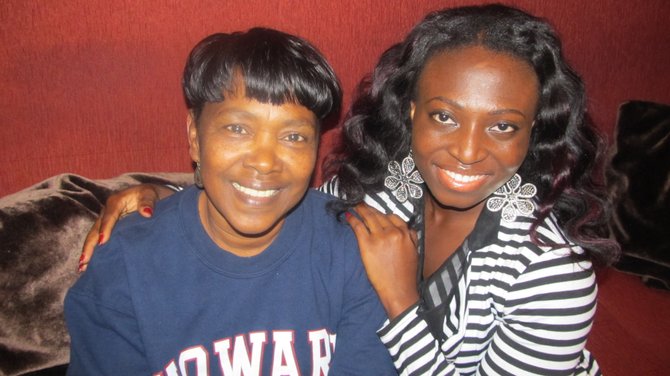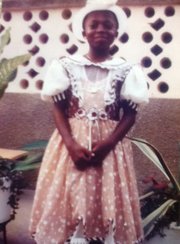Lillie Reynolds and Rosemary Osei in Reston Town Center in November. Photo by Victoria Ross.
Rosemary Osei, 22, and Lillie Reynolds, 61, have been good friends for four years. The two women, who help teach special needs students at a Vienna elementary school, are sometimes mistaken for mother and daughter.
They bonded over their faith—both are devout Christians—and family values.
Recently, they attended a rally for President Obama at George Mason University. The 2012 presidential election was the first time Osei was exercising her right to vote as an American citizen, and Reynolds was proud of her.
“Voting is a powerful feeling,” Reynolds said. “It’s one of the best things about being an American.”
Although they have much in common, both women said they’ve learned important lessons from their differences.
“We both experience being Americans in different ways. Rosemary came here because she wanted to come here,” Reynolds said. “My family was brought here in chains. . . . We’ve both found a way out of no way.”
Osei spent the first 12 years of her life in Ghana. In 2003, she and her younger brother, Reuben, reunited with her family in Centreville. She became an American citizen on Aug. 25, 2012.
“In over nine years of living in the U.S., my proudest moment was on Nov. 6, 2012 when I waited in line for over an hour to help re-elect the president of the United States. I am now proud to say I am an American citizen.”
LIKE MANY IMMIGRANTS, Osei said she grew up seeing America as a land of wealth and opportunity. She said there was always a celebration when family friends would come back from America, because they brought armfuls of clothes, candy and toys.
“When they came to Ghana from America, they had this, I don’t know, a certain ‘attitude.’ I thought, what is over there that makes people like this? It was something special and magical to me,” Osei said.
“Although I lived a comfortable life in Ghana, I believed that America would be a better place to live. To me America represents freedom and justice. Since the money is higher in America, I believed my family and I would become rich and have more money than we had in Ghana,” Osei said.
She said she was disheartened when — as a 7th grader at Liberty Elementary School — she did not receive the welcome she anticipated.
“In my country, when we saw white people, we welcomed them. We wanted them to think well of us and come back. I thought everyone would welcome me when I came here,” Osei said. Instead, Osei said she felt out of place “as though I didn't belong because of the complexion of my skin color.” She said she often cried, and ate lunch in the school’s bathroom. Within a month, the 12-year-old yearned to return to Ghana.
“I wanted to go back ‘home’ to my friends, to a place where I would be treated fairly and equally. I was very unhappy because I wasn't being welcomed and accepted for who I am as a person,” she said.
Reynolds said she understands that feeling all too well. She grew up in Mobile, Ala. in the 1950s and 60s, during state-sponsored segregation, a time when “Jim Crow” laws forced blacks and whites to use different drinking fountains, public parks, pools and transportation.
“I have a lot of friends from Africa. They didn't understand why I was so excited to be voting for President Obama the first time. I had to explain to them that we didn’t always have the right to vote, and I didn’t think I’d live to see the day I could vote for a black man,” Reynolds said.
Reynolds said she remembers when she and her sister would walk to the J.C. Penney in downtown Mobile.
“We were always followed and made to feel like we’re going to steal something. You could buy the clothes, but you couldn’t try them on because white people didn’t want to touch anything a black person wore,” she said.
Osei said it was eye opening to learn about the United States’ recent history of racial discrimination.
“When Lillie tells me stories about growing up in America as a black girl in the ‘60s, it breaks my heart,” Osei said.
“It's one thing to watch a movie on TV about how horrible African Americans were treated in the past, but it's another thing to know someone who lived through those experience.
“I was in my 40s, my 40s,” Reynolds said, pausing, “before I stopped hating myself for being black.”
“My daddy was a smart man,” she said. “He was a lumber-checker, and he was really good at math. He did everybody’s taxes in our part of town. But he couldn’t ride in the front seat of a car with a white person or he’d get arrested. He was talked down to by white people, called ‘boy,’ no matter if the white person was just a boy himself. I always felt hurt and angry for him.”
Reynolds said her grandmother had a saying that stuck with her “She would say nobody is better than you and you’re no better than anybody else. My family was smart. I grew up strong in one way and beat down in another.”
“When I would complain about (what I thought was unfair), I’d get the comment ‘why don’t you go back where you came from.’ That has to be the stupidest thing to say. I’m from here. I’m American, but there are times black people are made to feel like immigrants.”
Reynolds said Osei’s view of America is like so many other people who come here from other counties, who come seeking freedom and justice.
“My view of freedom and justice were things I knew were here, but because I'm a black American I would never truly have as long as white Americans viewed me as ‘different’ from them,” Reynolds said. “It took me to become an adult and to witness a black man become president of the United State of America before I could really feel proud about being an American. And make no mistake about it, I am proud to be an American, and proud to live here.”
BOTH REYNOLDS AND OSEI said they like living in Fairfax County, where they get to experience the benefits of such a vibrant, diverse culture.
“I am proud of so many things now. It makes me proud of America for how far we, as people, have changed for the better,” Osei said. “Most of all I am proud of Lillie for not allowing her past experience turns her into a bitter person—an angry black woman—but instead she is a stronger, independent black woman, who treats everyone with respect.”

